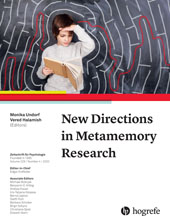Learning From (Test) Experience
Testing Without Feedback Promotes Metacognitive Sensitivity to Near-Perfect Recognition Memory
Abstract
Abstract. To date there has been relatively little research within the domain of metamemory that examines how individuals monitor their performance during memory tests, and whether the outcome of such monitoring informs subsequent memory predictions for novel items. In the current study, we sought to determine whether spontaneous monitoring of test performance can in fact help individuals better appreciate their memory abilities, and in turn shape future judgments of learning (JOLs). Specifically, in two experiments we examined recognition memory for visual images across three study-test cycles, each of which contained novel images. We found that across cycles, participants’ JOLs did in fact increase, reflecting metacognitive sensitivity to near-perfect levels of recognition memory performance. This finding suggests that individuals can and do monitor their test performance in the absence of explicit feedback, and further underscores the important role that test experience can play in shaping metacognitive evaluations of learning and remembering.
References
(1989). Memory predictions are based on ease of processing. Journal of Memory and Language, 28(5), 610–632. https://doi.org/10.1016/0749-596X(89)90016-8
(1999).
Assessing our own competence: Heuristics and illusions . In D. GopherA. KoriatEds., Attention and performance XVII: Cognitive regulation of performance: Interaction of theory and application (pp. 435–459). MIT Press.(2013). Self-regulated learning: Beliefs, techniques and illusions. Annual Review of Psychology, 64, 417–444. https://doi.org/10.1146/annurev-psych-113011-143823
(2008). Visual long-term memory has a massive storage capacity for object details. Proceedings of the National Academy of Sciences of the United States of America, 105(38), 14325–14329. https://doi.org/10.1073/pnas.0803390105
(2016).
Methodology for investigating human metamemory: Problems and pitfalls . In J. DunloskyS. K. TauberEds., The Oxford handbook of metamemory (pp. 23–37). Oxford University Press. https://doi.org/10.1093/oxfordhb/9780199336746.013.14(2007). The role of memory for past test in the underconfidence with practice effect. Journal of Experimental Psychology: Learning, Memory, and Cognition, 33(1), 238–244. https://doi.org/10.1037/0278-7393.33.1.238
(1976). Predicting recognition during storage: The capacity of the memory system to evaluate itself. Bulletin of the Psychonomic Society, 7(5), 425–428. https://doi.org/10.3758/BF03337236
(2013). Judgments of learning are influenced by multiple cues in addition to memory for past test accuracy. Archives of Scientific Psychology, 1, 23–32. https://doi.org/10.1037/arc0000003
(2016).
Internal mapping and its impact on measures of absolute and relative metacognitive accuracy . In J. DunloskyS. K. TauberEds., The Oxford handbook of metamemory (pp. 39–61). Oxford University Press. https://doi.org/10.1093/oxfordhb/9780199336746.013.15(2019). Misleading emotions: Judgments of learning overestimate recognition of negative and positive emotional images. Cognition & Emotion, 34, 1–12. https://doi.org/10.1080/02699931.2019.1682972
(2017). A misleading feeling of happiness: Metamemory for positive emotional and neutral pictures. Memory, 25(1), 35–43. https://doi.org/10.1080/09658211.2015.1122809
(1993). Remembering mistaken for knowing: Ease of retrieval as a basis for confidence in answers to general knowledge questions. Journal of Memory and Language, 32, 1–24. https://doi.org/10.1006/jmla.1993.1001
(1993). How do we know that we know? The accessibility model of the feeling of knowing. Psychological Review, 100, 609–639. https://doi.org/10.1037/0033-295X.100.4.609
(1997). Monitoring one’s own knowledge during study: A cue-utilization approach to judgments of learning. Journal of Experimental Psychology: General, 126(4), 349–370. https://doi.org/10.1037/0096-3445.126.4.349
(2005). Illusions of competence in monitoring one’s knowledge during study. Journal of Experimental Psychology: Learning Memory and Cognition, 31(2), 187–194. https://doi.org/10.1037/0278-7393.31.2.187
(2006a). Mending metacognitive illusions: A comparison of mnemonic-based and theory-based procedures. Journal of Experimental Psychology: Learning, Memory, and Cognition, 32, 1133–1145. https://doi.org/10.1037/0278-7393.32.5.1133
(2006b). Illusions of competence during study can be remedied by manipulations that enhance learners’ sensitivity to retrieval conditions at test. Memory & Cognition, 34, 959–972. https://doi.org/10.3758/BF03193244
(2004). Predicting one’s own forgetting: The role of experience-based and theory-based processes. Journal of Experimental Psychology: General, 133(4), 643–656. https://doi.org/10.1037/0096-3445.133.4.643
(2002). Comparing objective and subjective learning curves: Judgments of learning exhibit increased underconfidence with practice. Journal of Experimental Psychology: General, 131(2), 147–162. https://doi.org/10.1037/0096-3445.131.2.147
(2008). International Affective Picture System (IAPS): Affective ratings of pictures and instruction manual (Technical Report A-8). University of Florida, Gainesville, FL.
(2014). The Nencki Affective Picture System (NAPS): Introduction to a novel, standardized, wide-range, high-quality, realistic picture database. Behavior Research Methods, 46(2), 596–610. https://doi.org/10.3758/s13428-013-0379-1
(1995). Judgments of learning are affected by the kind of encoding in ways that cannot be attributed to the level of recall. Journal of Experimental Psychology: Learning, Memory, and Cognition, 21, 1263–1274. https://doi.org/10.1037/0278-7393.21.5.1263
(2008). Evidence that judgments of learning are causally related to study choice. Psychonomic Bulletin & Review, 15, 174–179. https://doi.org/10.3758/PBR.15.1.174
(2008). Confidence intervals from normalized data: A correction to Cousineau (2005). Tutorial in Quantitative Methods for Psychology, 4(2), 61–64. https://doi.org/10.20982/tqmp.04.2.p061
(1992). How shall we explain the delayed-judgment-of-learning effect? Psychological Science, 3(5), 317–319. https://doi.org/10.1111/j.1467-9280.1992.tb00681.x
(1972).
A theory of Pavlovian conditioning: Variations in the effectiveness of reinforcement and nonreinforcement . In A. H. BlackW. F. ProkasyEds., Classical conditioning II: Current research and theory (Vol. 2, pp. 64–99). Appleton-Century-Crofts.(2015). Perceptual blurring and recognition memory: A desirable difficulty effect revealed. Acta Psychologica, 160, 11–22. https://doi.org/10.1016/j.actpsy.2015.06.006
(1988). Pragmatics of measuring recognition memory: Applications to dementia and amnesia. Journal of Experimental Psychology: General, 117(1), 34–50. https://doi.org/10.1037/0096-3445.117.1.34
(1994). Delaying students’ metacognitive monitoring improves their accuracy in predicting their recognition performance. Journal of Educational Psychology, 86(2), 290–302. https://doi.org/10.1037/0022-0663.86.2.290
(2010). Subjective learning discounts test type: Evidence from an associative learning and transfer task. Experimental Psychology, 57, 327–337. https://doi.org/10.1027/1618-3169/a000039
(2017). Perceptual fluency contributes to effects of stimulus size on judgments of learning. Journal of Memory and Language, 92, 293–304. https://doi.org/10.1016/j.jml.2016.07.003
(2013). When disfluency is – and is not – a desirable difficulty: The influence of typeface clarity on metacognitive judgments and memory. Memory & Cognition, 41(2), 229–241. https://doi.org/10.3758/s13421-012-0255-8
(2010). “I’ll remember this!” Effects of emotionality on memory predictions versus memory performance. Journal of Memory and Language, 62, 240–253. https://doi.org/10.1016/j.jml.2009.11.004



